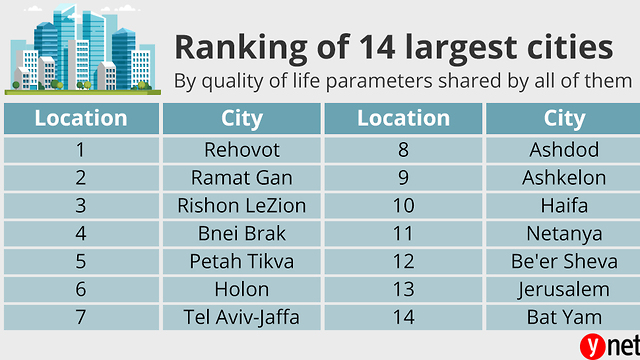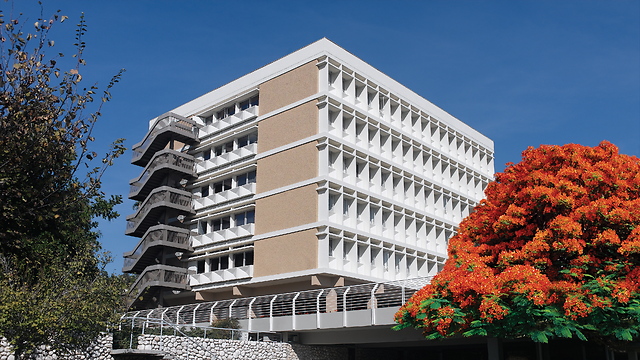
Rehovot ranked 1st in quality of life among Israel's 14 largest cities
While Ramat Gan has highest life expectancy, Rishon LeZion is first in residential area satisfaction and Bnei Brak has greatest life satisfaction, Rehovot ranked first overall in Central Bureau of Statistics report; Jerusalem ranked before last, Tel Aviv ranked first among country's three largest cities.
Rehovot is the city with the highest quality of life among Israel's 14 largest cities, Central Bureau of Statistics (CBS) data published this week showed. The central region city also leads in workplace satisfaction, apartment satisfaction and the feeling of being able to handle problems, while it was ranked last in infant mortality.
Following Rehovot in the rankings are Ramat Gan, Rishon LeZion, Bnei Brak, Petah Tikva, Holon and Tel Aviv. Rounding out the list are Jerusalem and Bat Yam.
The CBS explained that its rankings were only based on parameters shared by all of the cities on the list: employment rate, job satisfaction, vehicular accident mortalities and serious injuries, pedestrian mortalities and serious injuries, infant mortality, life expectancy, trust in the health system, self assessment of health, residential density, area of residence satisfaction, apartment satisfaction, number of 30 year olds with high school or academic diplomas, voting rate in 2015 elections, satisfaction with life, expectations regarding the future and the feeling of being able to handle problems.
In the chapter dealing with Rehovot, the statistics agency said that it ranked first in job and apartment satisfaction, feeling of being able to handle problems and occupants and pedestrians seriously wounded in vehicular accidents.
Of the 19 available parameters mentioned above, Rehovot was ranked below the national average on only three, and was doing better on the remaining 16.
The CBS's data further showed that infant mortality per 1,000 in Rehovot was lower than the national average—1.1 compared to 3.1, respectively—with satisfaction from cleanliness surrounding one's home slightly lower than the national average—51.3 percent compared to 53.4 percent, respectively.
Ranked second was Ramat Gan, which was first in life expectancy and in number of 30 year olds with high school or academic diplomas. It was, however, ranked 13th in feeling of being able to handle problems. Of the 24 parameters available to Ramat Gan, it was ranked below the national average in only six, whereas in 18 it was ranked over the average.
Of Israel's three largest cities, Tel Aviv was ranked first—and seventh overall. It was ranked first in employment rate, second in number of 30 year olds with high school or academic diplomas and 14th in traffic accident mortalities and pedestrian mortalities and serious injuries.
Haifa, meanwhile, was ranked tenth in the CBS's rankings. It was ranked first in residential density and last in workplace satisfaction and expectations regarding the future.
Bringing up the rear, both among Israel's three largest cities and the list in general, was the capital. Jerusalem was ranked 13th overall, first in trust in the health system and second in expectations about the future. It was, however, ranked dead last in satisfaction with area of residence.

Education and skills
The Central Bureau of Statistics attempted to create a snapshot of Israel's population according to parameters of quality of life, sustainability and national strength. In education, the bureau found that the rate of 15-17 year olds attending school during the 2015-2016 school year was 95.6 percent.
The rate of Arabs with an academic degree was found to be significantly lower than the comparable rate among Jews—36.4 percent compared to 60 percent. The rate of female Jews with an academic degree was almost double that of Arab women—70.7 percent compared to only 37.2 percent.
The rate of those possessing high-level literacy among Jews was similar to the Organization for Economic Cooperation and Development (OECD) average—44 percent compared to 46 percent, while among Arabs it was markedly lower—with only 16 percent.














